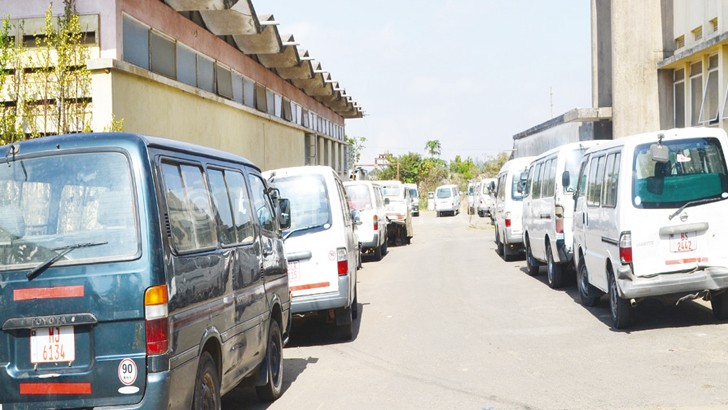Sharing minibus earnings
On the densely populated side of Limbe Market in Blantyre City, the closely parked minibuses confirm this is a money-spinning business.
Any minute, minibuses, once derided as death traps (m’dulamoyo) owing to the high rate of accidents involving them, swarm narrow streets usually constricted by their chaotically parked competitors.
“Yodzadza! Yopita!” screams a tout as the minibus I have taken makes its way through in a chocked street splitting the market.
Yet it is not time to leave.

It is not full. Minibuses in the country’s cities seldom get full.
“One more! Just one or two. One to go! All of you can squeeze in!” comes a call.
If you are a student, do not try this arithmetic in a math examination.
Chipiliro Mlolowa, 22, has been a tout for three years since he left his home in Chiradzulu in search of better life in the city.
“I have no skill or educational qualification for a better job,” says the tout from Bangwe Township in a brief interview as we wait for “the very last passenger”.
Chipiliro’s voice is hoarse. When he bellows, travellers trickle into a minibus one by one.
“I am to them what a muezzin is to devout Muslims,” he brags.
The callers scream with all their might and they get a golden handshake—an equivalent of what a passenger pays—when the bus is full.
Chipiliro terms the prohibited bus stop his goldmine—“mgodi wanga”.
The call boys hit gold all day by ‘selling’ travellers who admittedly can do without them.
But every pay they get exemplified how a minibus benefits a long line of people—more than just its proprietor and crew.
It is 10:17 am when we depart for Lunzu, a trip worth K500 per leg that temporary liberates me from the call boys’ din.
On the ride to Lunzu, I ask the driver about a day in the driving seat.
“A struggle,” he says.
Just two words?
“We start off in the morning, there is a whole queue waiting for a share of the earning. The owner has set lofty targets, then there are touts, traffic police, friends, fuel traders and many more. I have to think about my family and the conductor.”
They call the driver’s cut khobwe (cow peas) or msuzi (soup).
In fact, the amount of khobwe and stickiness of msuzi eases as “the queue lengthens”.
“Akwere nawo!”
Every mile, there are tout and porters scrambling for a share from proceeds of minibuses that come and go.
The K500 that Chipiliro received is shared between the call boys and Minibus Owners Association of Malawi (Moam) agents.
“I take K300 and Moam people get the change,” he says, saying he serves about 30 minibuses and earns up to K7 000 a day.
Rafiq Kananji, a Moam agent in Limbe, says the association deployed his team to collect K200 from every minibus coming their way.
“About 300 minibuses use Limbe depot every day,” he says.
According to Moam secretary Coaxley Kamange, the association has registered 4 800 minibuses in the Southern Region, 4 200 in the Centre and 700 in the North.
Moam and city councils get equal shares from the K200 payout, he says.
“We get K100 each,” he explains.
At Yiannakis depot on Masauko Chipembere Highway, touts banged the bodywork of the bus, demanding ina yake (anything) and hurling insults as we sped off.
Francis Faston, 39, tells us driving a minibus is “a tough routine”—waking up as early as 4am, dodging traffic police offices, paying kickbacks, sudden stops, parking in perilous and prohibited spaces, jostling for passengers, exchanging obscenities and working hard to meet the bwanas’ target.
“Expectation is high as some bosses demand up to K17 000 daily and I have to spend money all day, all the way,” he narrates.
Faston is always under pressure to meet the targets as there are many jobless drivers ready to takeover if he is fired.
“I have to find someone to assist me. Usually, minibus owners don’t employ conductors,” he explains.
Besides paying the conductor, he has to buy fuel for the day. He uses 25 to 30 litres, he says.
At Ginnery Corner, he pays K100 to the call boys whether passengers come on board or not. He pays some more at Kristwick, Mbayani, Chirimba and Kameza round about.
Yopita! Going. We go.
When we arrive at Lunzu, K1 000 has gone.
The driver pays a similar sum on the way back.
As money exchange hands in this endless relay race, his regular conductor, George Mwitha, says: “Without this minibus, we would be in the village.”
Bu it is the driver who shoulders the burden.
When traffic police capture him for a traffic offence, he has to pay a fine or kickback.
“Oftentimes, we bribe the officers with K3 000. Just yesterday, I was caught thrice. I shelled about K7 000 to buy my freedom,” he narrates.
Still, the minibus owner expects his money in full.
Josiah Kalilombe, who lives in Ndirande, says he expects his minibus to bring no less than K17 000 a day.
“We do business to make profit,” he explains. “Besides, I have to ensure the minibus is roadworthy and spend on insurance, certificate of fitness and maintenance. I have to pay the driver K35 000 every month.”
But he is not ignorant of how his bus, the main source of income for his family, meets financial needs of countless people on the roads of Blantyre.
“All I care about is my minibus has to be in good condition and the target must be met,” he says. n





